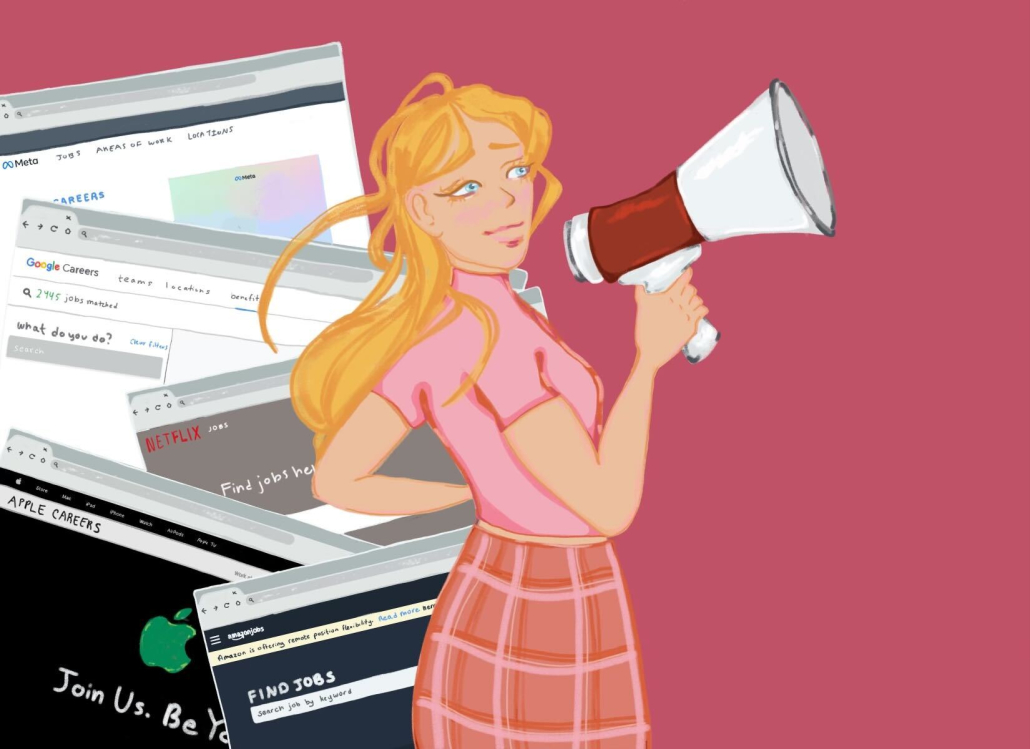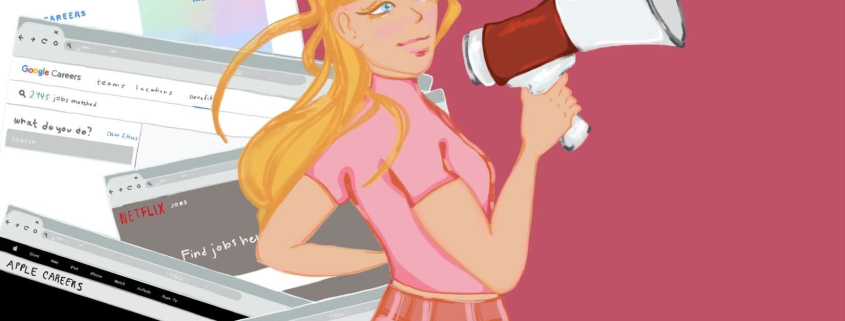‘Gaslight, Gatekeep, Girlboss’ glitch

By Ye JI JONG
Staff Writer
Gaslight, gatekeep, girlboss — it seems like that’s the new mainstream motto for women’s empowerment. Female CEOs and entrepreneurs have been pushing for women to go into male-dominated industries and reach positions of power. From Wall Street to Big Tech, women are encouraged to “girlboss their way to the top” and take over the public sphere. It’s not what women can do for capitalism, but what capitalism can do for women. This all sounds empowering and liberating, so what’s the problem?
Girlboss feminism fails to address one key issue: how can we be empowered at the expense of exploitation?
To succeed in the game of capitalism, there must always be a loser for there to be a winner — and oftentimes women are the losers. The term girlboss was coined by Sophia Amoruso, founder of Nasty Gal, an author and “girl boss” who made a fortune building an empire of fast fashion. She encouraged women to be unapologetically ambitious, oppose masculinity in power and gain capital as a form of feminist activism.
Although she succeeded, her fortune was built on anti-feminist beliefs. The Daily Northwestern reported that “In June 2020, reports of unsafe working conditions and insufficient pay in factories that supply Boohoo, Nasty Gal’s parent company, emerged. The report revealed that the factory did not follow social distancing guidelines and workers were expected to continue working even after testing positive for the coronavirus. Additionally, the workers were paid as little at $4.40 an hour.”
While Amoruso succeeded, it came from underpaying and exploiting impoverished communities — the epitome of girlboss feminism. It’s not questioning the structure of capitalism or structural violence, but rather gaining power within those systems to beat the man.
Oftentimes gaining power in this capitalist context comes at the expense of other women, as well. From sweatshop factories to sex work, girlboss feminism tends to further marginalize and profit off these gendered and harmful types of labor. Putting a woman in a position of power doesn’t guarantee she’ll make “feminist decisions.”
But Amoruso isn’t alone.
Nonprofit organizations and programs that purport to empower young girls to break into male-dominated fields can also produce similar outcomes.
For example, Reshma Saujani, the founder of Girls Who Code, made powerful statements about accountability and activism at Yale’s 2022 commencement ceremony. She stated, “[Our country] should be doing a hell of a lot more. It should be providing healthcare and childcare, saving our planet and our democracy, making the rich pay their fair share. And yes, making workplaces pay up,” when referring to government accountability.
While her words held a lot of validity, I questioned whether her line of work followed suit. Girls Who Code, a feminist organization dedicated to closing the gender gap in tech, has previously partnered with companies like Meta and the Boston Consulting Group for opportunities in augmented reality, music and interview prep. But, isn’t it ironic that the same words of “making the rich pay their fair share” and “making workplaces pay” are referring to these same companies? These Fortune 500 corporations are responsible for widespread data collection and privacy violations, harmful misinformation and immense cash windfalls. They represent unchecked capitalism, which is at the core of gendered structural violence.
But the problem isn’t the women who are in a position of power making harmful choices. The problem isn’t necessarily girlboss feminism or these pipelines to unethical corporations. In fact, I don’t think it’s right to blame women or a type of feminism for the issues that capitalism and the patriarchy have created. I think girlboss feminism and these pipelines are a product of oppression, because in all honesty, what other choice do women really have?
Men have been succeeding with exploitive and aggressive tactics, but when girlboss feminists do it, it suddenly becomes an issue. Regardless of success or failure, women will be criticized for any type of activism. Marxist feminists are labeled as “dangerous radicals,” but liberal feminists are now “pick-me’s.” It seems too often that the common denominator is just misogyny. To be a woman is already seen as an opposition to men, thus being a woman displeased with the system is a threat to men. It’s a vicious cycle of misogyny, and for us to point fingers at women and feminist movements rather than the big picture is counter-intuitive.
So, to all the girlbosses out there: It’s not your fault. Don’t blame individual action for a systemic problem. Society was built against you, and in all honesty, there is no “ethical way to win.” Regardless of what you do or how you do it, the patriarchy is always going to find a way to rain on your parade. Of course, take constructive criticism and acknowledge the issues that come with girlbossing. Do your best to avoid adding to the problem you’re trying to fight against. But if a man ever tells you that you’re “doing it wrong,” feel free to gaslight and gatekeep him, because you’re a girlboss.

